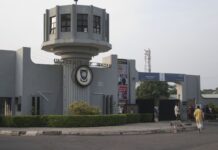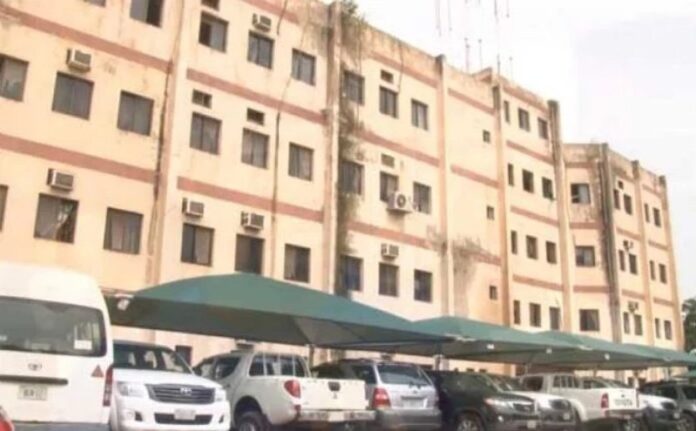Sonala Olumhense
The National Library Project in Abuja, which began in 1981, was woken up last week, courtesy of Minister of Education Tunji Alausa.
But it is a little murky as to exactly what he announced.
According to The Cable, for instance, the government plans to complete the first phase of the project by June 2025, about two months from now.
Leadership heard it differently: The project is “finally set to restart construction by June 2025,” it reported.
Alausa disclosed that the project’s new fortunes are owed to President Tinubu directing TETFund to set a certain percentage of its budget aside for it.
The first phase, including “Basement level one, basement level two, ground floor, first floor, and second floor, and all external work [will] “commence on or before June 2025.”
I applaud Tinubu for this gesture. Consider that we have had 10 other leaders since 1981.
Hopefully, this project—not simply Phase I—will be completed. Nigeria is dotted with thousands of projects that never progressed beyond that mythical stage.
Better still, I hope it will be speedily completed as a singular demonstration of commitment in no more than one year.
In many of those thousands of “Phase I” projects, which were plundered so that the beneficiaries could become landlords in Abuja and chieftains of political parties, there was indeed some kind of start.
Keep in mind: only recently, Musa Aliyu, the chairman of the Independent Corrupt Practices Commission, told the stunning story of an undisclosed hospital “in Nigeria that was paid 100 per cent five times,” without it being built.
Neither the National Assembly nor the mass media has shown the requisite courage or concern to compel him to identify the thieves or resign.
But the real problem is that, as a people, we are often on the side of the thieves. They know we do not care and that they can thrive because we are too busy admiring their mansions and new cars while they steal from us and our children.
This is why the National Library, which ought to have inspired states, local governments, and institutions to develop their own, was never built. Like the thousands of looters quietly protected and nurtured by powerful institutions such as the ICPC and EFCC, Aliyu’s collectors of five full payments for that one hospital are out there somewhere, bragging about how “hard” they worked for their “wealth.”
The truth is that a society can be no wealthier than its appreciation of education and history. In Nigeria, we have no such respect, which is why we lack libraries and archives. We are never going to see the presidential libraries that some former Nigerian leaders claim they are building. Remember, in modern times, a physical building alone does not make a library—digital structures are far cheaper, easier to establish, and far more impactful, reaching people across the world and through generations.
What have we done with this bold new world? Nothing. I have often complained in this column, for instance, that Nigeria’s National Assembly is a caricature of a true legislative body, with no interest in legislation or history.
Look at their version of Nigeria’s legislative history.
Of greater importance, NASS has no archive, let alone a comprehensive one. Consider that Nigeria has now had 10 consecutive legislatures in 26 years of the Fourth Republic, but there is nothing substantive about it let alone the previous ones, reflecting the development of our laws and when they were passed, let alone the legislators who have served various constituencies and committees in every legislature.
Our legislature’s website is the emptiest, most irresponsible and most illiterate of all the 181 legislatures of the Inter-Parliamentary Union.
Where others offer extensive buffets of history and information, including complete records, transparent insight and citizen participation, the Nigerian legislature offers Nigerians this empty wasteland.
Consider the examples of Australia or South Africa. With a serious legislature, such as the United States, you can track and trace your representatives over the years, and the archives are available when you are.
Although I have praised President Tinubu for his decision to build the National Library, the executive is at the heart of Nigeria’s information hollowness.
Consider how empty the website of his presidency is, despite his vast information team.
Observe how the archives of his predecessors have been scrubbed out. On the contrary, here are the archives of the predecessors of President Donald Trump.
This scourge of archive suppression in Nigeria is widespread. Filthy-rich NNPC, for instance, has a professional and slick website. For this huge enterprise that is nearly 50 years old, however, the nearest thing to an archive is a segment it calls Documents, but click that, and it opens into a series of pretentious folders, each of which opens into—wait for it—“There are no files in this folder.”
The EFCC, which has an annual reporting obligation it does not honour, proclaims an archives section. Curiously, however, it contains only two files: “Christian Anti-Corruption Preaching,” whatever that is, and “Muslim Anti-Corruption Preaching. Each is empty.
David Umahi is Nigeria’s 25th Minister of Works since 1960. The Ministry does not report annually. Even its Audit Unit, according to the Ministry itself, is still awaiting its functions. On the contrary, companies with which the ministry does business, such as CCECC and Julius Berger, fastidiously report annually, enabling investors and the public to monitor their work.
And then there is the Bureau of Public Procurement. Following the proclamation of the Public Procurement Act in 2007, that agency began the practice of publishing a list of all federal contracts, listing the contractor and the MDA involved, as well the cost and the duration of the contract. Here is the first such bulletin, for 2007, and then for 2016. The practice quietly dried up in the first year of the bogus anti-corruption champion.
This is exactly how we hoodwink history: we make the facts inaccessible. We ignore the information imperative, such as the Gani Fawehinmi Research Centre story I published here in August 2017.
Most Nigerian public offices, including those outside the country—such as embassies and consulates—operate in the same manner I have described here.
The website of Nigeria’s Permanent Mission to the United Nations, for instance, has not been updated in the past decade.
Why is this important? Two weeks ago, I wrote about a “comprehensive economic plan” that had allegedly been unveiled by the Minister of Finance, Mr Wale Edun. I could not find it. I still cannot.
In two, perhaps five years, somebody is going to be bragging about what the mythical economic plan they had.
In a similar way, very soon, somebody is going to be talking about the origins and management of the emergency rule just inflicted on Rivers State in the same way that the events of the Olusegun Obasanjo government of just two decades ago are now being presented as if that is folklore.
It is only an organised system of published information that will save us from ourselves.


























































